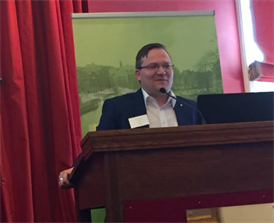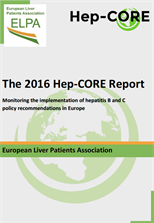2016 hep-CORE Report: Monitoring European policy responses to viral hepatitis
Thoughts from Mark Korenjak Board Member, European Liver Patients Association and Prof. Jeffrey V. Lazarus, Associated Researcher, ISGlobal, Hospital Clínic, University of Barcelona, WHO Collaborating Centre on HIV and Viral Hepatitis and Editor-in-Chief, Hepatology, Medicine and Policy.
21 Apr 2017Marko Korenjak ELPA
European Liver Patients’ Association (ELPA) represents 27 countries from Europe, Egypt and Israel. We have 36 national patients’ organizations that all together connect 100.000 liver patients, their families and volunteers.
When the World Health Organization in May 2016 at the World Health Assembly endorsed the Global Health Sector Strategy (GHSS) on viral hepatitis 2016-2021, patients representatives expected quick steps in the directions for elimination of viral hepatitis as a public health threat by 2030. As people are dying every day from conditions that could be treated, we started to search for solutions.
The first problem we encountered in the effort to develop a strategy was lack of “real” time data on hepatitis B and C in different countries in Europe, Egypt and Israel. We managed to secure a budget for research and included long-time friend of ELPA, Professor Jeffrey Lazarus in the process of developing a tool that could solve this problem. The result was a survey with 39 questions and a number of sub-questions that was developed by Prof. Lazarus together with an international team of experts. Furthermore, after a hard work on e-mails, phones and presentation of positive effects of the survey, ELPA managed to achieve 100% response from our members. At the end of 2016 we had real-time data on hepatitis B and C that included data from governmental sources and also form national patient representatives.


We use the data for our advocacy purposes for example in Macedonia the government changed their policy regarding treatment of hepatitis C patients and more people are now getting the drugs they need. In the future we will use the data to monitor the progress of different countries and their commitment to elimination of viral hepatitis. Every year we will repeat a small part of the survey, once per year we will refresh the data according new conditions and every few years we will repeat the whole survey.
The most important point of the survey is the ability to track changes from the patient’s perspective – from the bottom up. Sometimes we have governments that have all the necessary documents like national guidelines, but at the end of the line the patients are still waiting to long for the treatment.
The elimination of viral hepatitis will only be possible if we combine all of our resources from patient, politicians and physicians. We should develop the arias we are good at: politician for making the change possible from systemic perspective, physicians for treatment and advocacy for better health services and patients for informing other patients of benefits of treatments and empowering them to take responsibility for their health.
We will keep on fighting because, for an average reader it is going to take 2 minutes to read this text, and in this time 5 people will die because the untreated viral hepatitis that could be prevented by availability of proper health services/products.
Prof. Jeffrey V. Lazarus
"Large numbers of PWID with HCV will only come forward to seek testing and treatment in the coming years if other more knowledgeable PWID assure them that it is safe to do so – i.e. that the new drugs are far more tolerable and more effective than interferon, and that health care providers will show PWID the same respect as other patients.
What can those of us who serve as public health and clinical experts do to make this a shared cause? What might it mean to each of us individually to draw more on the expertise of the most affected communities in our work, as we did in the 2016 Hep-CORE report presented at the Summit? And how can we collectively ensure that their voices are heard throughout and beyond the field of hepatology?”
Click here to read more of the thoughts of Prof. Jeffrey Lazurus
Share this on: